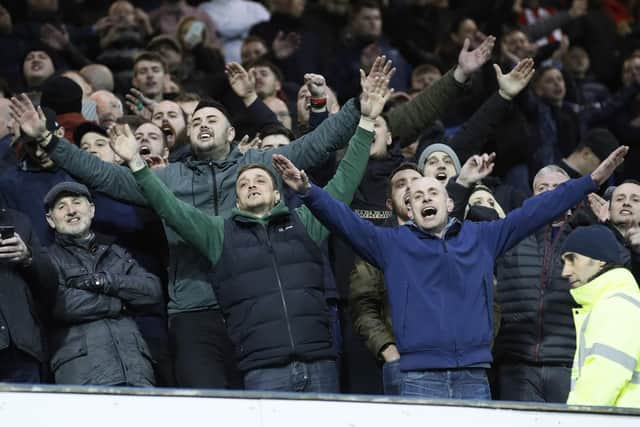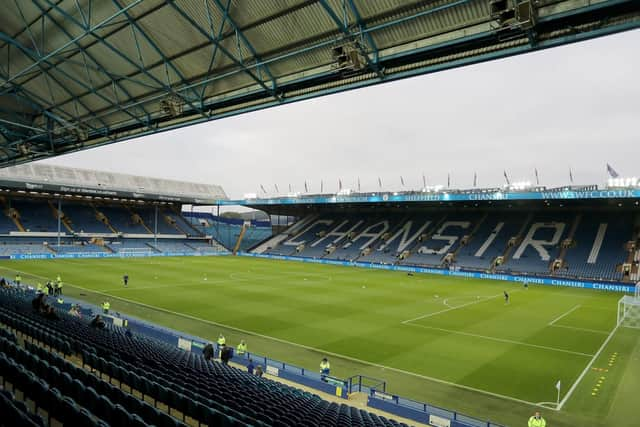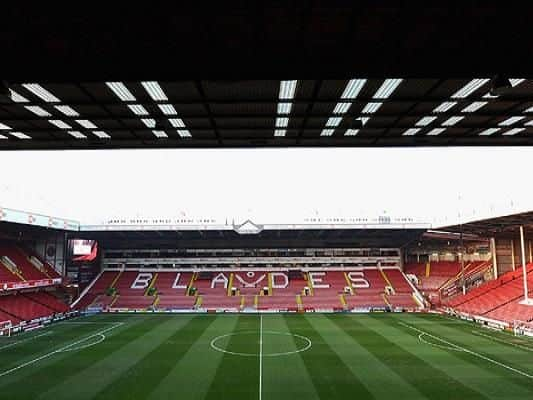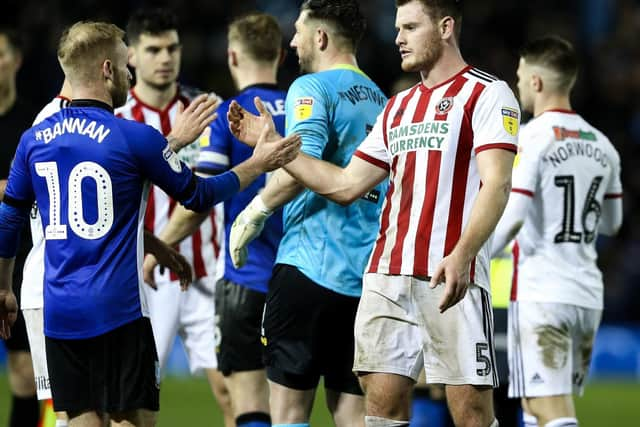The country’s most senior police officer with responsibility for football is quizzed on the issues to emerge from the derby between Sheffield Wednesday and Sheffield United


South Yorkshire Deputy Chief Constable Mark Roberts has addressed concerns expressed by many supporters about the policing of this month's derby between Sheffield Wednesday and Sheffield United at Hillsborough.
In an interview with The Star's James Shield, DCC Roberts, the football lead on the National Police Chief's Council, was tackled on a number of issues arising from the game including claims disorder following the match could have been avoided and accusations there is not enough collaboration between officers and fans ahead of fixtures between the two clubs.
Advertisement
Hide AdAdvertisement
Hide AdDCC Roberts, who has previously served in both Manchester and Cheshire, was also questioned on his call for Sheffield derbies to only be scheduled in midweek - a proposal which has proved controversial with followers of both United and Wednesday - and why games involving the Steel City rivals the most expensive to police in the country. The role of a new Independent Advisory Group (IAG), comprised of representatives from both team's support bases and South Yorkshire Police, was another matter discussed, together with reports DCC Roberts wants clubs to contribute more towards police costs.
James Shield: SYP have promised a review into how the derby was policed. Will you speak to supporters as part of this process and will the findings be made public?
DCC Mark Roberts: I think, with any big operation, you tend to do a review. We've picked up feedback. We've considered the whole game, pre-match, during the match and post-match. It's to see what went well and what didn't, what we could do better. The first people we asked was the fans' groups, through the IAG. We'll get the results, the findings, though soon. There were bits after the game where it got a bit tense on Leppings Lane. We probably need to look at that, to see what we were trying to do and so the fans know what we were trying to do. It would be good if the fans said 'hold us back' or 'don't hold us back' so we get a clear steer on what they want. Then, we can consider it and say 'yes' or 'we've looked at it and we don't think that will work for this reason.'


JS: Many of those who attended this month's derby complained there was no 'hold back' to keep rival fans apart. Is this the case?
Advertisement
Hide AdAdvertisement
Hide AdMR: The message was that we'd probably would but that we'd take a decision on the night. We've got to be able to justify it because effectively we are containing people. To do that, you've got to make an assessment on the night. There are a couple of options for doing a hold back at Hillsborough at that particular end. You can do it in the stadium, so fans are kept in the seats or sometimes on the concourse. But because of the layout outside, there's that area, if you can picture it, between the turnstiles and the road. On the night, the commander was trying to balance keeping people safe and keeping them comfortable. He took the view, he felt, that there was more risk of them being in discomfort by keeping them in the stand. He took the view the fans would have a better scenario if you let them into the outer area. So the idea was to give them more space, so they didn't feel as confined on the hold back. The downside was that you then had some Wednesday fans throwing missiles into it. People felt threatened by that. Decent fans felt uncomfortable and then you had your fair share of idiots on both sides involved in missile throwing. The police had to deal with that, because decent fans were caught in the middle of it. That's why we need the communication with the fans. The ideal way is that you let everyone out together and they all walk away, chatting happily, and then go for a pint together. Maybe we could keep food bars open so people can be held back, if that's needed, in a more comfortable way.
JS: Are you confident, once the review is completed, that it will inspire greater confidence among fans?
MR: We'd hope so. We need to reassure the fans that what we're trying to do is keep them safe. It would be in our interests to reduce the number of police officers required. If the fans understand that and explain some of the dilemmas, and they come to us and say that sounds reasonable, then that's better. If we engage with the fans, then that's got to breed a degree of confidence. They might not 100 per cent agree with us all the time but hopefully they will see the benefits and it will breed a positive relationship.


JS: Are you disappointed, in a personal and professional capacity, with some of the views expressed by supporters after the last derby?
Advertisement
Hide AdAdvertisement
Hide AdMR: We need to have a look. Let's get to the facts. Social media is always an interesting read. The things I'm conscious of it that, on the first read, or if you see a clip of video, it can be out of context. So I prefer to read into the whole thing. It's disappointing because I'd rather just be reading about the football. I always think a good policing operation is like a good referee, where you hardly see it. We won't bury our heads in the sand, we'll be open and take the feedback. If we can do things better, we'll listen and do it. I'm not going to criticise people on the ground for an easy life. If we think we got things wrong, we'll apologise. If we think we got it right, we'll say so. The important thing is to have a conversation with the fans.
JS: An independent advisory group, containing representatives of United's fan base, Wednesday's fan base and the police has recently been formed. What are your thoughts on this?
MR: There's a few around, not as many as you would like. I'd like to see it at every force area. West Midlands have done a lot and that's worked well. There's been one formed in Manchester. In terms of here, it would have been great if it was sooner but we've got one now and it's up and running. Hopefully it goes from strength to strength.


JS: From a police perspective, is there a reason why one was not established here earlier?
Advertisement
Hide AdAdvertisement
Hide AdMR: There wasn't a bar. I've got the national football remit. There came a point where we'd talked about it and then I just said get it sorted. We've got there. Yes, it would have been better if we'd got there sooner. But now we'll put our energy into making it the best it can be.
JS: There are some excellent best practice examples going on involving police forces across the country, including the 'Onside Project' in the West Midlands. Football can be force for good.
MR: Football can be a really positive thing. If you can give people incentives to behave through the clubs, that's a good thing. Going back to neigbourhood policing, it helps to do that. Because if you don't have neighbourhood officers, it's difficult to do. There's some good stuff going on.
JS: Do you believe that banning orders are the best way to deal with those involved in disorder? Are they an effective tool?
Advertisement
Hide AdAdvertisement
Hide AdMR: Banning orders are one of the most valuable tools we've got. The national strategy for football is three elements. You want to engage with people. At the other end, you have people who are fans who want to engage in violence. In the middle, you have people who don't have that in mind but who might get sucked in if they've had a drink in them. We can try to engage with them as well, through the media. If you can take out 100 or so at a club, who are engaged in violence, then it has a beneficial effect on 50,000 or so other people inside the stadium. They are issued by the courts. The police can't just issue them. On the continent, when you describe the powers we have got, they'd want them.


JS: This isn't a tourist derby. So do you view policing it as a public order exercise or an exercise in community policing?
MR: It's kind of all of the above. We want to start with it being a community event, where our primary job is to ensure people are safe. The clubs are making quite a lot of money out of them, we want to help support them in making sure people are safe. If we see a public order situation developing, we have to make sure we have the capability to deal with that. One of the things we stress on operations is that officers keep thinking. So we don't deal with a normal decent fan in the same way you would a troublemaker. It can be difficult, if something is happening, for an officer just to switch mindset. But we try.
JS: In terms of clubs making money, you have mentioned them paying more to cover the costs of policing matches. If this happens, will you then target the night time economy and can you understand why some people will view this as a step towards privatisation of the police?
Advertisement
Hide AdAdvertisement
Hide AdMR: I don't see that at all. What we've got to accept is that football is a wealthy industry. Last year, the Premier League clubs paid something like £211m to agents. That is more than 27 out of 43 police forces get to deliver 24 hour, seven days a week policing with the complexities that come with that. The PL is incredibly wealthy, but the EFL makes masses of money too with a £600m television deal. You've got Wolves paying £15m for Ruben Neves. The problem is, when football needs the police to come in and support their commercial operation, that's not free. So everything we spend on football we don't spend on something else, such a child sex exploitation. The Ipswich case means we are not now able to recover as many of our costs. There has got to be a balance and we have responsibilities to the wider public. Just because people in Sheffield have a football match, it doesn't mean people in Doncaster and Barnsley should get a worse service. Pre-Ipswich, if the land was controlled by the club, like a road, then we could charge for policing that and recover the cost. Ipswich says we can't. If we weren't subsidising football, we could put 27 officers in gangs team in Sheffield of Rotherham. We are not making a profit. We will never make a profit.
JS: You recently stated that you would prefer meetings between United and Wednesday to only take place in midweek, rather than on weekends. Why?
MR: On a Monday, Tuesday, Wednesday night, we can minimise the amount of time people have to drink. We've seen on weekends, even if it's an early kick-off, you can then have a situation at 1am. It stretches the operation out. If people drink more, there will be more trouble. We don't want trouble. So with the Safety Advisory Group and the clubs, if we can say if you play this at this time it minimises trouble, then that's what we'll do.
JS: Yet other derbies, including the Old Firm and ones in London, regularly take place on a Saturday or a Sunday. Why is it different here?
Advertisement
Hide AdAdvertisement
Hide AdMR: It comes down to individual circumstances. It's what impact it has, what's the size of the force, there's a whole combination of factors. The argument will come that football pays its taxes. We have a great relationship with the PL and hopefully we'll have a club from Sheffield in it next year. But we want to work with football.
JS: Are you prepared to listen to fans on this matter?
MR: Yes. If there's ways suggested that we can facilitate it at a weekend, without stripping South Yorkshire's towns of police, then of course we'd listen. If games can be rescheduled for a television audience, though, I don't see why it can't be rescheduled for public safety. But yes, of course we'll listen.
JS: A lot of supporters have an issue with mass surveillance techniques and feel as if, simply because they choose to attend a football match, they are subject to procedures other members of the public would not accept.
MR: I could throw it back and say if you walk down a city centre street, you're on film. If you're in a ground, you're on film. But I can understand it's different because it's more personal. The use of it, we need to be clear about. We shouldn't be taking general shots. If we're looking at crowd dynamics, okay. But not just generally. If we find out that officers are filming fans for no particular reason, then that's useful feed back for me. I can ask them, there might not be a good reason and I can say stop it. Or there might be a good reason. But it's a tactic. At the moment, in football, we have a problem with hate crime incidents. A 67 per cent increase in football. If you have people chanting on a terrace, you have a choice as a commander. You could put officers in but you could then turn it into a public order situation. The better options is to film them. It can dissuade people if they know they are on film. Or we can make arrests at half time or retrospectively. It's a really useful tactic but we need to use it properly. The groups are useful because, if one officer is doing it and people feel there is a potential issue there, we can look at why.
Advertisement
Hide AdAdvertisement
Hide AdJS: Why is the Sheffield derby the most expensive match in the country to police?
MR: If you look at the layouts of the ground, there's a bigger footprint for the clubs in terms of owning land. There is also the factor of the number of stewards. There is the capability of reducing some of the costs. The CCTV capability at Manchester, say, is phenomenal. Then there's facilities. What we have here is big clubs, with big followings. The grounds aren't modern and they are right in the middle of communities. That all adds to the complexities. Take the old Maine Road, Manchester City's previous ground. It was a nightmare to police because it was a rabbit warren. There's a few things that combine.
JS: What are the other factors to consider? Is Hillsborough, although I accept this is unfair on officers now, one of them?
MR: On occasion, we also probably over resource. And I'm up for the conversation about this. Clearly the force is in an area where there's been a significant disaster. Explicitly, it's not a factor. But implicitly, it probably is. People think we can't let that happen again.' And that's right, It can't. Ever. In part, that might drive a tendency to over-resource. There is a desire, from fans and planners, to have no trouble. We tend to put resources all over the place to try and police all the potential flash points out. In Manchester, there was an acceptance that if two groups of idiots want to arrange a meet and knock hell out of each other, we'll try and deal with it but our main focus is the vast majority who don't want that. It's maybe more pragmatic. What we'd like to look at is a more proportional resource. But that requires dialogue with fans. Because if we do that, and something happens, then what we'd be faced with is people saying 'why have you done that?'
The 'Ipswich Case' Explained
Advertisement
Hide AdAdvertisement
Hide AdIn 2016, the High Court agreed that Suffolk Constabulary (SC) were entitled to recover the cost of placing officers on streets surrounding Ipswich Town's Portman Road stadium on matchdays. But a year later, the Championship club won its appeal against that ruling, with three judges being told the law had been misinterpreted.
During the initial case, lawyers for the police argued Town controlled certain highways around the ground; a claim disputed by the Championship club.
Thirteen months ago, SC was told it could not appeal against that decision by the Supreme Court.
Speaking after that judgement, a Town spokesman said: "We are pleased that the matter is closed and that we continue to have a good working relationship with Suffolk Police."
Advertisement
Hide AdAdvertisement
Hide AdTim Passmore, Suffolk Police and Crime Commissioner, said: "We are disappointed with the outcome of this decision from the Supreme Court."
"We will now take some time to consider the implications for the force and once they have been fully assessed in due course we will be in a position to comment further," he added.